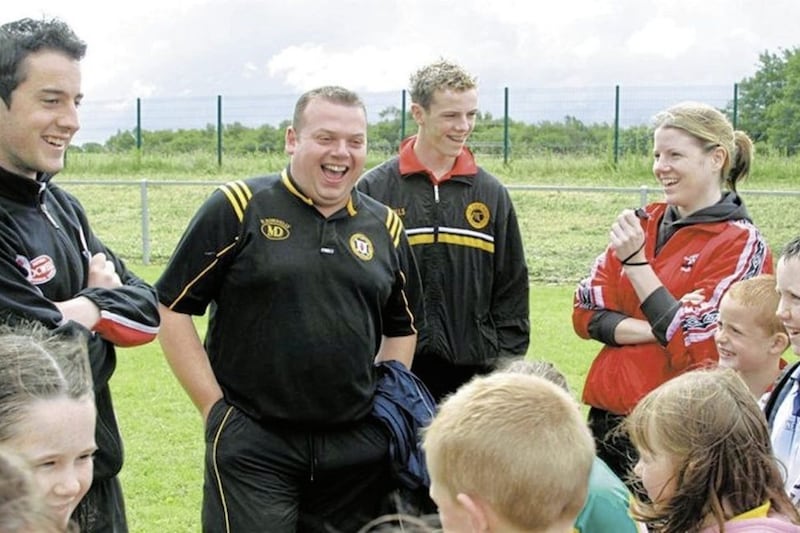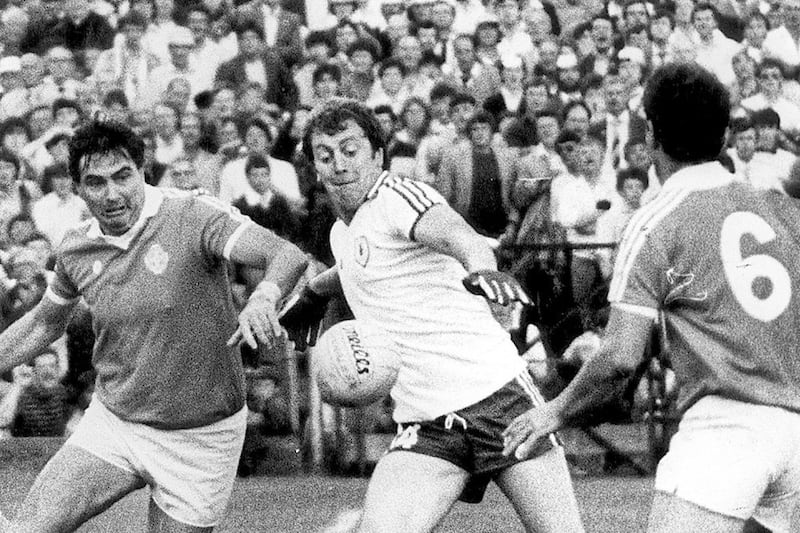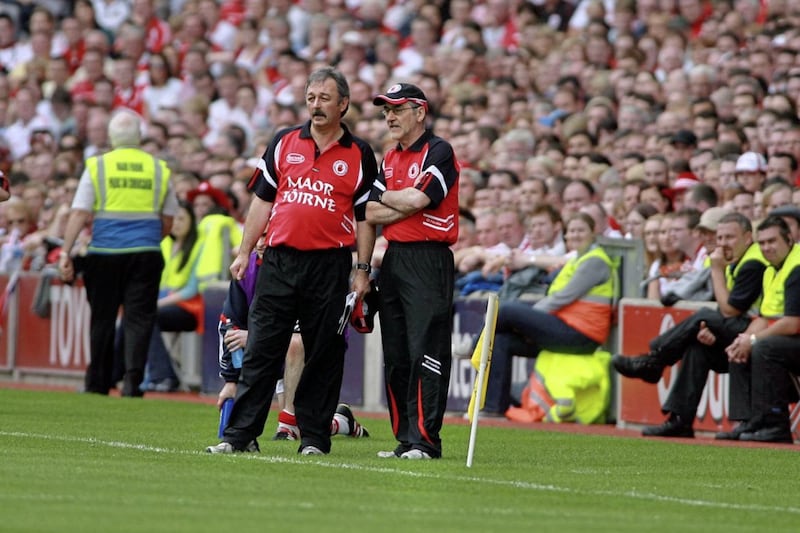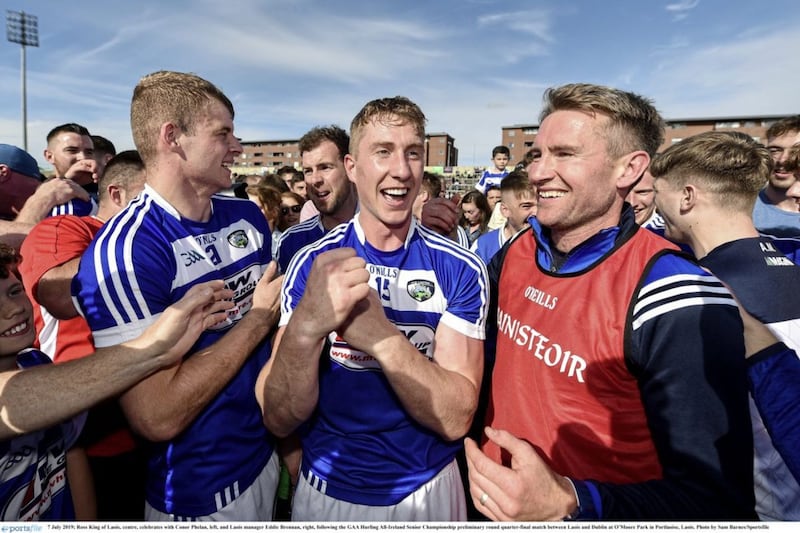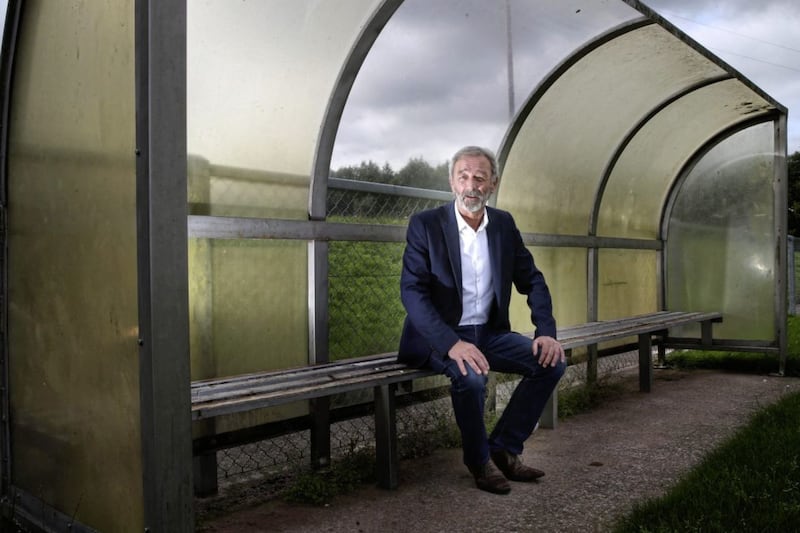“HERE comes the boy who couldn’t find a space for Colm Cavanagh in his Allstar team,” comes the shout from the other side of the car park.
A warm smile plays across Tony Donnelly’s lips as he nods before jooking down, cigar in one hand, lighter in the other, the red car in front serving as a makeshift windbreaker.
Work has just finished for the day at his tutoring service on the outskirts of Dungannon, hours spent expanding young minds now giving way to the freedom of a Wednesday afternoon.
“Ah, it’s not too bad,” he says, “there’s other days are full on, busy all day, but today I can get wrapped up and away early enough.”
“It was tough on my mum and dad. I knew I was self-destructing. And I also knew the next phase of that, if I had carried on, it was not being here. I was in a very dark place...” - the life and times of Caolan Mooney
Cookstown joint-manager Jason Quinn doesn’t underestimate the challenge of Four Masters in the Ulster semi-final
It wasn’t always this way of course. Not so long ago Donnelly would have been grabbing a quick bite to eat then heading straight on to a management meeting. Or to training at Garvaghey.
In almost a decade as Mickey Harte’s right hand man in Tyrone, football was life and life was football.
He was the eye in the sky in 2003, Tyrone’s invisible man in the stands; a figure so firmly in the background that the Red Hand players barely even knew who Tony Donnelly was, or that he was involved at all.
Tyrone will have no scar tissue from 2017 Dublin defeat insists Tony Donnelly
Within a couple of years, though, he was an integral part of the backroom team; a cornerstone of Tyrone’s subsequent All-Ireland successes in 2005 and 2008. And with that trademark moustache and cowboy’s glare, he became almost as familiar a figure on the line as Harte himself.
Yet, for the first time, the Tyrone boss is preparing for an All-Ireland senior final without his most trusted confidante, four years after Donnelly decided to step away.
There are no regrets, and not a hint of ill feeling. The pair chat as often as ever, and Donnelly would still be an informal sounding board for Harte – on the good days and the bad.
After all, this was not a friendship formed on the line or in stuffy rooms talking tactics, but during three years sharing student digs in west Belfast while the Troubles raged on the streets that surrounded them.
The pioneer and the chain-smoker who liked a pint – an unlikely double act to some, but a marriage made in heaven that revolutionised the Red Hands.
********************************************************************
HE remembers well the first conversation. It was September 1972 and Tony Donnelly had just moved from St Ciaran’s College, Ballygawley to the Christian Brothers in Omagh to do his A-levels.
A few weeks later Tyrone were due to face Cork in the All-Ireland minor final – a Red Hand team that included a jet-heeled young forward called Mickey Harte.
“I kept a close eye on the football, played a bit but not to any standard, and on the Thursday or Friday before the final I went over to Mickey and Colm McAleer, who was on the panel too, to wish them all the best.
“That was the first time we were ever talking to each other. We just sort of chatted about football a bit after that, became friends, mates. A few years later we both ended up going to St Joseph’s teacher training college and rooming together there.”
They lived in a house on the Whiterock Road through the week at a time when news bulletins delivered an almost daily diet of death and destruction, reporting atrocities that often occurred only short distances from their door.
“The army barracks was right beside us so there were constant foot patrols, the odd blow of smoke going up of a bomb somewhere.
“There were some hairy experiences. Sometimes walking home at night you’d come upon a covert army patrol and next thing you were down an entry, getting spread-eagled and searched.
“It was an awful time for our parents, but then they wanted you to have an education. My mother would say about the anxiety they’d have gone through until you were home on a Friday evening.”
Yet even amid the darkest of times there were moments of mirth.
Donnelly smiles as he recalls the night the pair were accosted for carrying what the British army deemed offensive weapons.
“We had started up a darts club in St Joe’s at that time, a couple of the pubs on the Falls Road, Andersonstown Road would’ve played against each other.
“One night we were coming up the road from playing a match, I suppose it was maybe 12 or half 12 at night, and we were stopped. They took exception to Mickey having darts on him.
“They thought they were weapons of some kind; I said to the soldier ‘you must’ve seen him play’. It’s fair to say there was a humour bypass by that stage!”
Moments like that, memories forged in troubled times, strengthened their friendship. Football, though, was always the glue that bound them.
“We would share more or less the same sense of humour and we didn’t take our studies too seriously. Mickey would’ve become more studious later on but at that time, whatever was the least you could do to get by in exams, we did.
“We were just young fellas enjoying ourselves. The difference being I suppose I would’ve smoked and took a pint where he wouldn’t. But in every other regard we were pretty similar.
“At times it seemed as though we talked about nothing else only Gaelic football. Your life revolved around it, and for the likes of me it revolved around the partying after it too.”
********************************************************************
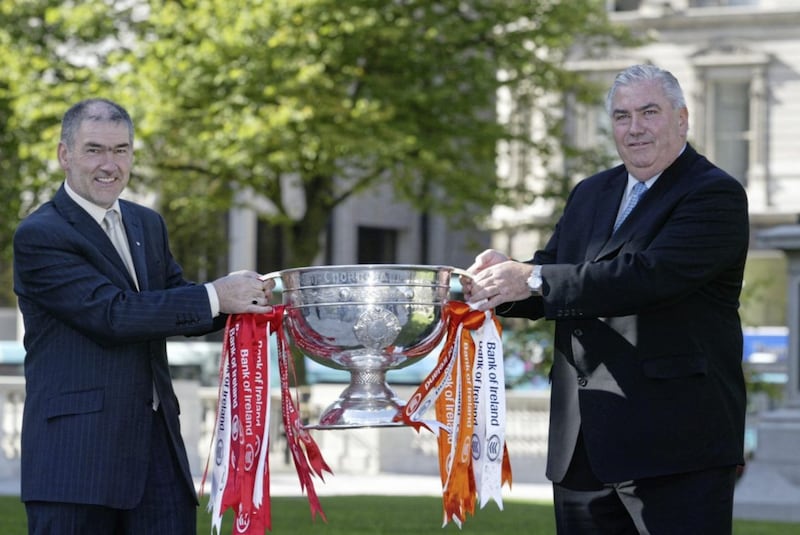
BE Joe Kernan - the instruction was simple. During Mickey Harte’s first year over the seniors, a natural progression following years of underage success, he elicited the help of an old friend as his eyes and ears in the stand.
It was nothing official. There was no Tyrone tracksuit, no debrief at training. It was strictly match days, a quick word through the wire at half-time and that was it.
Even the players didn’t know he was involved.
“We never saw Tony,” recalls three-time All-Ireland winner Enda McGinley.
“We were aware Mickey was using somebody in the stand but we didn’t really know him - he wouldn’t have carried a huge persona within Tyrone football at that time. But Mickey obviously trusted him completely.”
So much so that Harte asked him to get inside the mind of Armagh’s manager ahead of the biggest game in Tyrone’s history – the 2003 All-Ireland final clash with the Orchardmen.
“Mickey wanted me to be Joe Kernan. He wanted me to tell him how I would set up in this All-Ireland final to try and maximise Armagh’s chances of winning. We were debating ‘if I’m Joe Kernan, would I play two inside? Three inside?’ Things like that.
“It was that sort of rapport that would open things up. Mickey knew what his team could offer and what they could bring to the table but maybe he wanted a detached view.
“It was food for thought I suppose. How much he used of it I don’t know.”
Such modesty doesn’t quite stand the test of time considering the Red Hands went on to wrestle the Sam Maguire from Armagh’s grasp to bring a first All-Ireland title to the O’Neill County.
In 2005 Donnelly came onboard as a fully fledged member of the Tyrone backroom team, and the players – including Harte’s current number two Gavin Devlin – were left to wonder what kind of character they would be working with.
“Word got out that a friend of Mickey’s was coming in and ‘Horse’ had this notion it would be another pioneer or whatever.
“But the first night we had a wee social gathering between the McKenna Cup and the League, and I was over having a pint - ‘Horse’ was quite disbelieving when he saw that.”
“Tony would almost be a slightly roguish character,” adds McGinley.
“Obviously Mickey’s very clean cut both in his standards and what he expects from everybody else – Tony wouldn’t be just as clean cut.
“But it was a healthy mix. When you’re dealing with 30-plus lads on a panel, very few are of the same ilk as Mickey.
“Tony acted as, not so much an intermediary, but a softer side of the management team; that person who could get into the players’ minds and communicate with the players in a different way.
“The boys would still be very, very fond of him now.”
Donnelly, though, admits he had initial concerns about what exactly he could bring to the party.
“I would’ve doubted whether I could offer anything at county level, not having been a county player.
“I was finished playing when I was 21-22 with a back injury, went into management with Augher at 24, and myself and Mickey McKenna and Martin Daly managed to win county titles in ‘82 and ‘85.
“But Mickey’s great at instilling belief in people and he felt I knew what I was talking about. That said, I remember in the first McKenna Cup game we were playing Cavan and I was standing looking at legends like Peter Canavan and Chris Lawn thinking ‘they’re not going to listen to an arsehole like me’.”
He needn’t have worried. Partly because of the esteem in which they held Harte, and largely because of the immediate impression he made, Donnelly was accepted from the off and became a key figure over the next decade.
“If somebody was just there to be the jovial half of the management team, the players would have sussed that out,” says McGinley.
“He wouldn’t have gained the respect of the boys if he was just a bit of a cad or a bit of craic. It was his footballing knowledge and his tactical know-how that was absolutely massive.
“You could never pin down what was Tony’s input, and what was Mickey’s input. When you know the game well enough, you realise it’s really hard to make complex things seem as simple as Tony did.
“He could examine opposition’s thoughts, point out wee weaknesses of our own in a way that we only became stronger with it.
“Then if we were doing video analysis, or in team meetings, he had a great way of bringing a bit of light-heartedness into it. Some of his take-downs of opponents are somewhat legendary.
“He had a great way of making opponents less intimidating than maybe their records might have suggested.”
“Managing the team maybe wouldn’t have worked with two Mickeys - it definitely wouldn’t have worked with two of me. The thing would’ve imploded very quickly,” laughs Donnelly.
“But I would try sometimes to lighten it. Enda would be very serious and sometimes I’d give him a wee poke.
“I’d be going through the teams, would you rather have Mark Vaughan or ‘Mugsy’? ‘Mugsy’ every day. Brogan or McGuigan? McGuigan. Shane Ryan or Enda? Hmmm... discuss.
“The boys enjoyed that sort of thing. But the three of us – Fergal [McCann], me and Mickey - worked as a team. There were no egos, Mickey wasn’t a dictator, we just worked together.”
********************************************************************
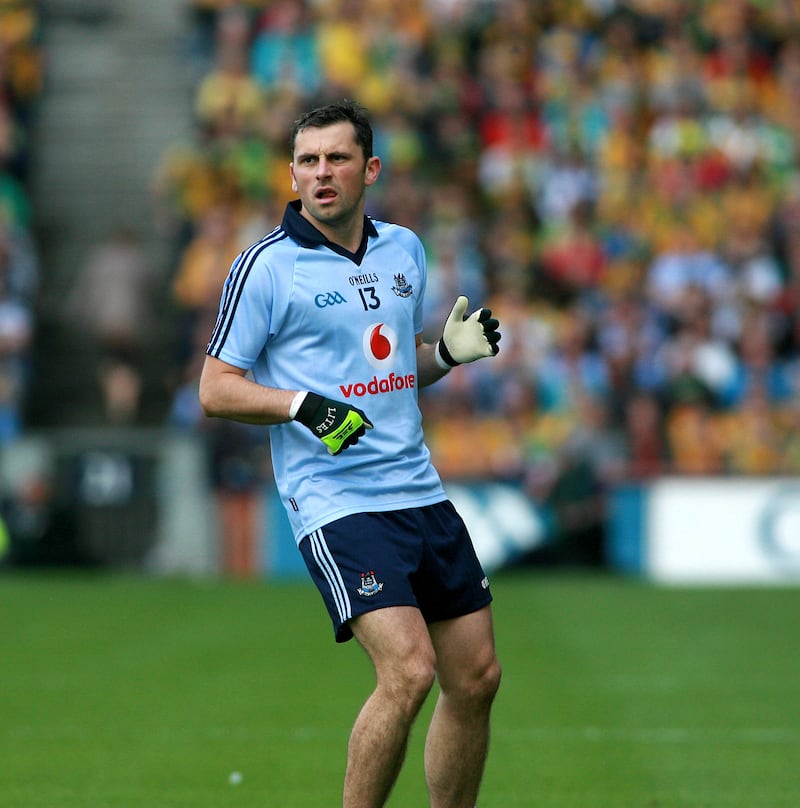
AUGUST 13, 2005. Almost 80,000 crammed into Croke Park, the overwhelming majority clad in sky blue loving what they are seeing as Dublin run Tyrone ragged.
There’s five points in it at half-time – it should be more.
When the Tyrone players come in at the break, Harte doesn’t read the riot act. Instead, he and Donnelly convene separately before returning to the group.
Seven positional switches are made, a shake and a shimmy of Owen Mulligan’s hips and suddenly the Hill is silenced as the Red Hands rescue a draw from a game that looked gone.
“We had to be on the same page, so the two of us continually communicated.
“There was a raft of changes in that Dublin game but only one substitution made. It was all positional.”
In that instant, Donnelly narrows his eyes and stares off into the distance as though transported back 13 summers.
“They were dominant with Ciaran Whelan around midfield, we were deploying a sweeper and Alan Brogan was wrecking us. We had to change the set up of the team, we had to get Gormley onto Brogan, we had to get ‘Ricey’ [McMenamin] out from corner-back to give us more drive from half-back.
“When Tomas Quinn got their goal before half-time, as a management team, it was what we wanted. The boys knew we were in a bit of a hole here, whereas it would’ve been different if we went in two behind.
“We juggled it around. We wanted to be more potent, so we got Enda’s position changed, we got big Joe [McMahon] to midfield, [Conor] Gormley out, ‘Ricey’ out, we got Philly [Jordan] put back, we juggled the whole thing around again.
“There were that many switches I had to read out the new team. We line out as follows…”
It proved to be one of several turning points in a crazy rollercoaster of a year that ended with a second Sam in three years before the completion of an era-defining treble in 2008.
The well of success may have run dry eventually but the road continued in front of them – and what a journey it was.
From the buzz of being on the line to building bonds with squads of men that would never be broken, Tony Donnelly wouldn’t trade those memories for anything.
And when it came to leading the celebrations, there was only one man Harte would turn to.
“After we’d won an Ulster title Mickey would maybe say to me ‘you that takes a pint, you decide what they’re doing tonight’. The boys would be waiting on some official word.
“So I says ‘right lads, we’ve won an Ulster title. It’s not what we want to finish on this year, we’ve big goals ahead, but nobody has to be jooking or dodging about tonight’.
“Then I turned to ‘Mugsy’: ‘Have a drink, but in moderation - I don’t want to be lifting the paper tomorrow morning to see a photo of you in some pole dancing club at four in the morning’.
“Everybody laughed and that was me finished, bit of silence, people going on about their business. Then ‘Mugsy’ pipes up... ‘you haven’t an address for that pole-dancing club Tony, have you?’”
The laughter is as raucous now as it was then.
“Ah they were great times, they really were,” he says. “I wouldn’t change a minute of it.
“And if the players look back and say well, we enjoyed our time, and it did help us in some way, you can only take that and say thank you.”


